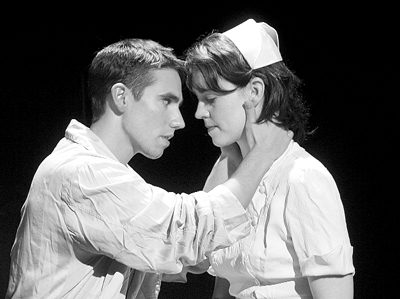Amid the ravages of war, men forge the means of coming together to heal
John Patrick’s “The Hasty Heart” is an intensely sentimental play with a creaky structure and obvious plotting. The exposition is clumsy and feels dated, and throughout there are few surprises in store for the audience. And yet, for all this, only the abjectly cynical and misanthropic could fail to be moved by the lovely, intimate production the play has been given by the Keen Company.
This is a World War II drama from 1945, and it isn’t even remotely shy about grabbing for the heartstrings and giving them a good strum. Yet with the country today in the midst of a war that it has been distanced from by design and with an administration that does everything it can to remove the human factor of loss, death, loneliness and shattered hopes war engenders from popular awareness, this simple play in a small theater becomes deeply moving. It is not a play about death—though death figures prominently—rather it is a play about the hope that we all have that we can get through the challenges in our paths.
The plot concerns five soldiers on a sick ward in the South Pacific in the last days of the war. The men who are there are pretty well out of the fighting, and may not return to their regiments. They while away the time teasing the nurse Margaret, writing letters and mending from wounds of various severity. Into their midst is placed a Scottish soldier, Lachlen, who they are told is going to die. He has been placed there by the camp’s colonel in hopes that the camaraderie of the men will ease Lachlen’s final days. Lachlen, however, does not know that his days are numbered, and at first resists the friendship of the men on principle—not wanting to owe any man anything. Yet when he finally gives into their company, he reveals a yearning loneliness he previously never thought could be lessened.
Patrick writes with a bit too much joviality and at times lays on the pathos, but nonetheless, he really does find the hearts of the men in the play. The title comes from a proverb that Lachlen quotes—“sorrow comes from the hasty heart”—meaning that making rash decisions ends inevitably in disaster, but Patrick shows that the heart, hasty or not, has the power to discern truth if only one will let it.
The superb production under the direction of Jonathan Silverstein minimizes the dated nature of the play and finds instead the classic dynamic of men—straight men, mind you—together. At once childish, wise, quick to anger and idiosyncratic, they have found a way to balance their shared recuperation in order to survive each day and their ordeal as a group. The company is made up of highly accomplished actors who work with an easy naturalism that keeps the energy fluid and engaging. Special notice should also be given to dialect coach Stephen Gabis who has coached the cast to make subtle distinctions between the New Zealander, Australian and British soldiers, particularly given that their cultural differences are an important part of the comedy.
The two primary characters are Lachlen and Yank, a brash American who is a frenetic mix of emotions and encumbered by a severe stammer. As performed by Chris Hutchinson, Yank is particularly electric without seeming to act. He inhabits the character as a man who is intensely emotional yet restrained. As Lachlen, Keith Nobbs is extraordinary. His accent seems flawless, but what makes the performance is the contained focus and smoldering feeling Nobbs brings to the role. Lachlen is always watching, always on guard and even when he is not focused there is this sense that he is watching every moment, just in case. Of course, the irony that death is closer than he knows creates tension, but at the same time, our hearts go out to Lachlen just as those of the characters in the play do, for we all relate to that longing to relax and believe that something good can happen.
The other soldiers—Brain Sgambati as Digger the Australian; Paul Sinnerton as Kiwi, the New Zealander; Anthony Manna as Tommy from Britain and Chris Chalk as Blossom, an African tribesman who speaks no English—are all terrific. Their roles exist mostly to flesh out the environment, yet each of these men finds something unique and engaging in the role. Emily Donahoe is likewise quite fine as the nurse Margaret, creating a touching portrayal of a woman who has been forced to grow up by the war yet remains vulnerable and human.
It is the humanity of these characters that comes through and creates a nearly perfect evening out of a less than perfect play. As we learn, it’s not in what’s on the page but in the playing that dramatic theater is born.


































